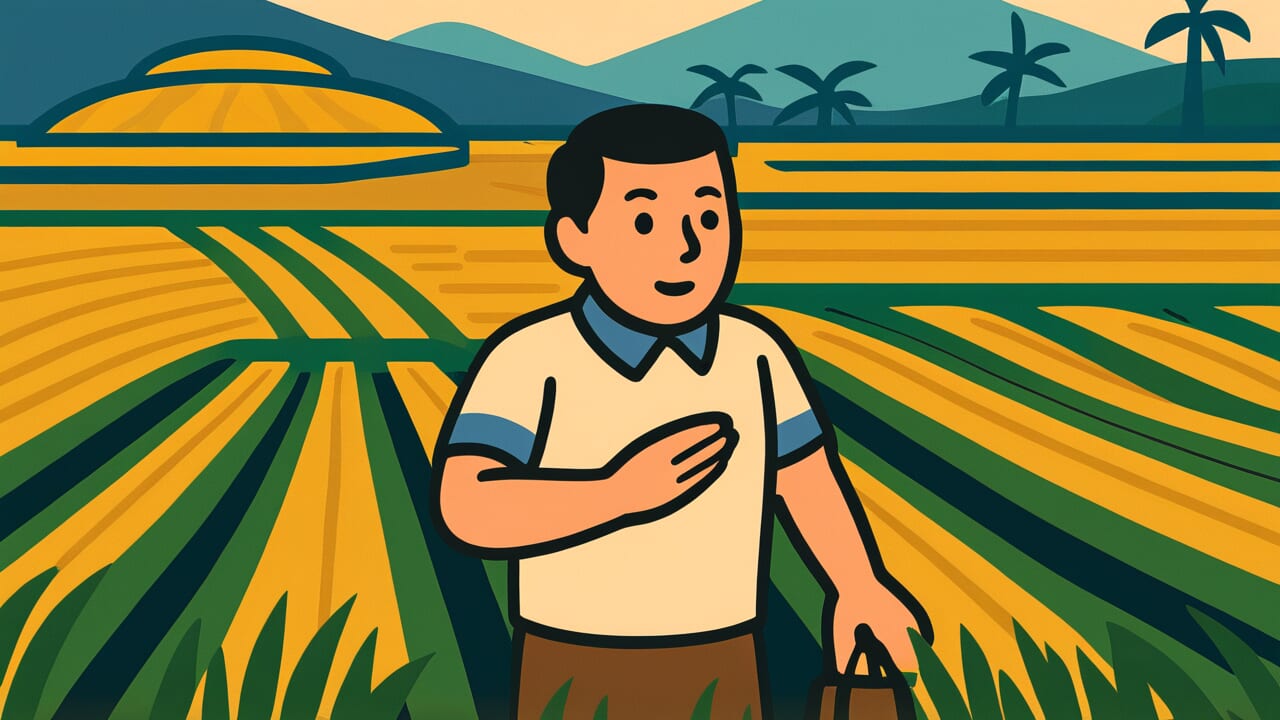How to Read “People among people, rice fields among rice fields”
Hito wa hitonaka, ta wa tanaka
Meaning of “People among people, rice fields among rice fields”
This proverb means that people grow best when surrounded by many others. Rice fields thrive most when positioned in the middle of other rice fields.
The saying teaches that human growth requires interaction, competition, and cooperation with various people. When isolated, your perspective narrows and you can’t see your own flaws.
But when you place yourself among many people, you encounter different values. Sometimes you face harsh criticism. Sometimes you receive encouragement. Through all this, you become stronger as a person.
The benefit of rice fields being among other fields comes from practical farming wisdom. When surrounded by other fields, water management stays stable. Wind damage decreases. A rich harvest becomes more likely.
This proverb pairs two completely different subjects—human growth and rice cultivation. This makes the importance of “optimal environment” memorable and striking.
Even today, people use this saying in education and training contexts. It emphasizes the value of diverse human interaction.
Origin and Etymology
The exact first written appearance of this proverb remains unclear. It likely emerged from years of experience and observation in Japanese farming villages.
What’s interesting is how this proverb pairs two completely different subjects. It contrasts the optimal environment for each.
For people, it speaks of “hitonaka”—being among many people. For rice fields, it mentions “tanaka”—being in the middle position surrounded by other fields.
The advantage of fields being in the center comes from practical farming knowledge. Fields surrounded by others are easier to manage for water. They suffer less wind damage. Farmers can also observe neighboring fields as reference points for cultivation.
The idea that people are strengthened among others reflects traditional Japanese thinking about human development. Rather than living in isolation, people grow through interaction with diverse individuals.
They polish themselves through mutual encouragement and competition. By cleverly combining these two different phenomena, the proverb became memorable and persuasive. This helped it take root in Japanese culture.
Usage Examples
- My son said he wanted to start his own business alone. But people among people, rice fields among rice fields, so I advised him to gain experience at a company first.
- My friend was hesitating about studying abroad. I encouraged them saying people among people, rice fields among rice fields—jump into an environment where you can meet many people.
Universal Wisdom
This proverb has been passed down through generations because it contains a fundamental truth about human growth. That truth is: people can only grow through relationships with others.
Alone, we cannot even understand who we are. Only when others serve as mirrors can we see our strengths and weaknesses.
By competing with someone, we learn our limits. By receiving help, we learn humility. By helping others, we realize our own value. In solitude, these discoveries never come.
What’s interesting is the proverb’s use of “hitonaka”—literally “people-middle.” It doesn’t just say “among people” but emphasizes being in the center.
This carries a strong message: actively place yourself at the heart of the circle. Don’t stand at the edge as an observer. The value lies in being tested at the center.
The rice field metaphor is also insightful. Protected by surroundings while simultaneously competing and influencing each other. This delicate balance creates the best growth environment.
Not a completely protected greenhouse. Not a harsh wilderness either. A place where moderate stimulation and moderate stability coexist. Our ancestors understood that such places foster the greatest growth.
When AI Hears This
Information theory has a principle: “By referencing surrounding information, you can express data with fewer bits.” This proverb demonstrates exactly that principle through language.
The character “人” (person) alone has incomplete meaning. But the moment it becomes “人中” (among people), a rich meaning emerges—”being among many people.”
Similarly, “田” (field) gains the meaning “among many fields” when it becomes “田中.” Just one additional character multiplies the information content several times over.
This uses the same mechanism as “predictive compression” in information compression algorithms. When ZIP format compresses files, computers learn patterns like “this character often follows that character.” This makes the data smaller.
If you can predict that “中” follows “人,” you don’t need to store all the information to restore the meaning.
Even more interesting is how this proverb repeats the same structure twice. The symmetry of “people among people” and “rice fields among rice fields” lets the reader’s brain instantly learn the pattern: “character + middle = within a group.”
This is exactly “generalization from few samples” in machine learning. Making someone understand a rule from just two examples represents ultimate information efficiency.
Lessons for Today
This proverb teaches modern people that growth requires “the courage to jump into the circle of people.”
In modern society, the internet lets us access vast information alone. But gaining information and growing as a person are different things.
Screen-based interaction cannot provide what face-to-face human collision and support can. Real learning exists in those direct encounters.
If you’re hesitating to jump into a new environment right now, remember this proverb. Feeling anxious is natural. But that anxiety is the entrance to growth.
By placing yourself among many people, you’ll meet parts of yourself you never knew existed.
The key is not being passive. Just being among people isn’t enough. You need to actively engage, learn, and sometimes fail.
Just as rice fields share water with surrounding fields, you should share experiences and wisdom with people around you. By doing so, you’ll grow rich yourself while enriching those around you.



Comments